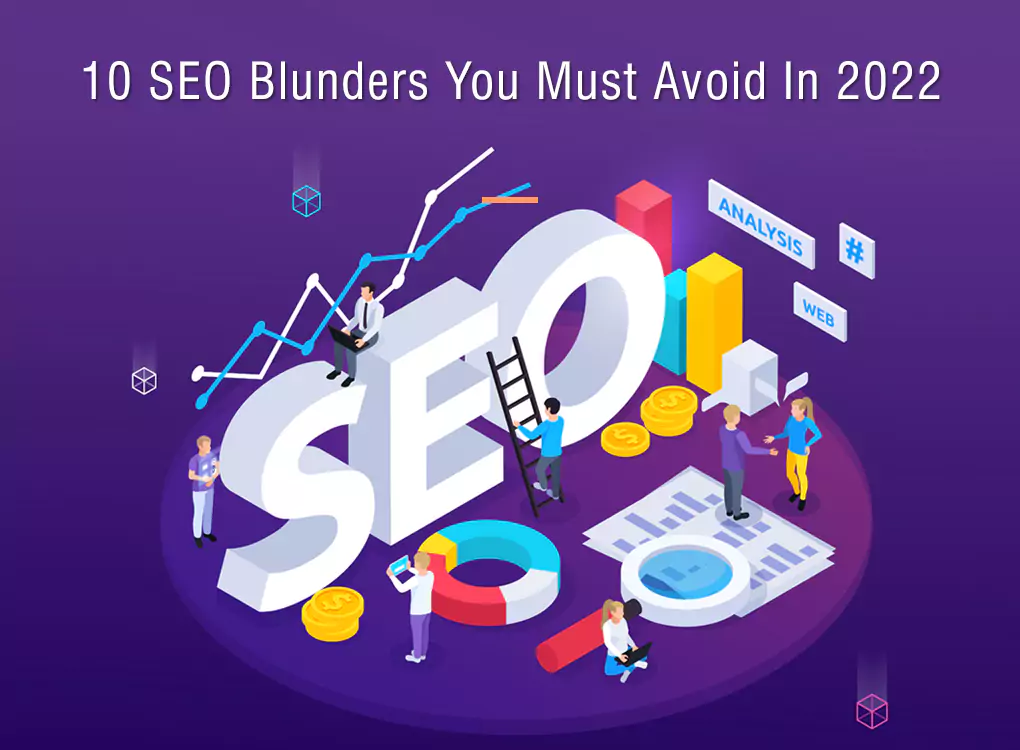When was the last time you updated your Search Engine Optimization (SEO) strategy? If it’s been more than a couple of years, then it’s the right time to refresh your approach in 2022. Let’s discuss mistakes you must avoid if you’re keen about ranking better on search engines.
Mistake #1: Overstuffing Content With Keywords
Keywords will carry on to play an important role in ranking, but their excess usage will hurt your rankings in 2022.
Keyword density is defined as the frequency (stated as a percentage) at which your targeted keyword or phrase appears in your content. Google has never mentioned an ‘ideal’ density, but a majority of experts agree that it shouldn’t cross 2%.
So if you are still inclined towards overstuffing your content with words, it’s time to discontinue. Write naturally rather than aiming to provide the best reader experience.
Mistake #2: Not Outfitting To Search Intent
Understanding ‘search intent’ is fundamental to succeeding in 2022 and onwards. Get into the user’s mindset and figure out what their objective is. Are they inclined towards buying a product? Compare several products? Get additional information about a topic? Once you recognize their intention, you can offer them real answers and solutions—and this will finally help you rank better.
Mistake #3: Failing To Update ‘Google Business’ Listing
You may already have “Google My Business” profile for your business. But are the details still right? The information in your listing should essentially match the details you have provided on your website. If things don’t tally, your rankings will suffer.
Mistake #4: Failing To Optimize For Long-Tail Keywords
It’s still essential to optimize for specific keywords that bring in verifiably high search volumes. But don’t optimize for those words only. You are also required to optimize for related keywords and searches associated with a major keyword—including plurals, rephrased searches, modifiers, questions, synonyms, and highly-related search terms.
Mistake #5: Not Keeping A Check Over The Competition
One of the ideal ways to advance your rankings is to look at what competitors are doing. Prepare a list of competing brands that rank better than you and go through their websites. Have a look at their content. Have an eye on what SEO methods they use.
Mistake #6: Failing To Track Session Duration
Do sire visitors stay long enough to consume your content? Google uses more than 200 ranking factors, and ‘session duration’ is among the utmost vital. It indicates how much time your visitors spend on your website prior to returning to the search engine results page. The longer they stay, the additional credibility Google assigns to your website.
Mistake #7: Overlooking To Do Periodic Audits
A website audit allows you to analyze your site’s overall performance from the standpoint of users and search engines. Does it load fast enough? Is the navigation user-friendly? Are all links working as they should? Watchful scrutiny will disclose problems and opportunities to upgrade your website.
Mistake #8: Buying Backlinks
At present, backlinks are earned—not purchased. Google has turned out to be very good at spotting spammy behavior and fining offenders.
Mistake #9: Aiming Too Much On Mobile
With over 50% of web traffic generated from smartphones and similar mobile devices, it’s more essential than ever to invest in mobile responsiveness and optimization for SEO Strategy. But this doesn’t mean overlooking desktop users.
In the end, desktop devices remain to be the leader in many areas together with jobs and education, computers and electronics, business and industry, science, social networks, and the internet and telecom. Most conversions in these fields still take place on desktops. What’s more, desktop users tend to stay longer.
Mistake #10: Duplicate Content
Duplicate content pages are quite a common problem with e-commerce websites selling alike products with exactly similar product descriptions. Fortunately, it’s fixable. You can set up 301 redirects from the duplicate pages to the original pages. One more option is to employ the rel=canonical attribute or use the content=”noindex,follow” meta robots tag for the HTML head of each page you want to exclude from Google’s index. The finest solution depends on your goals.
Do you need help freshening up your overall SEO strategy for 2022? Reach out to Arista systems today.


